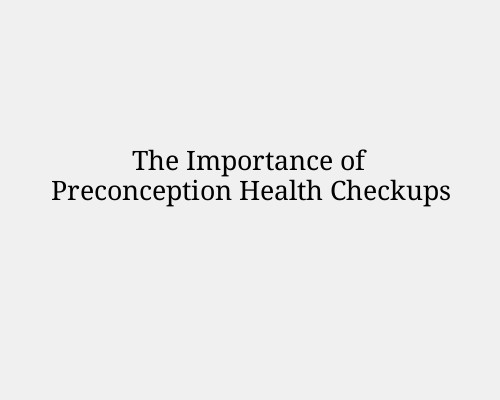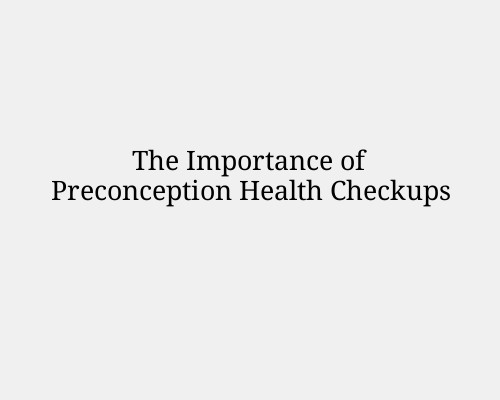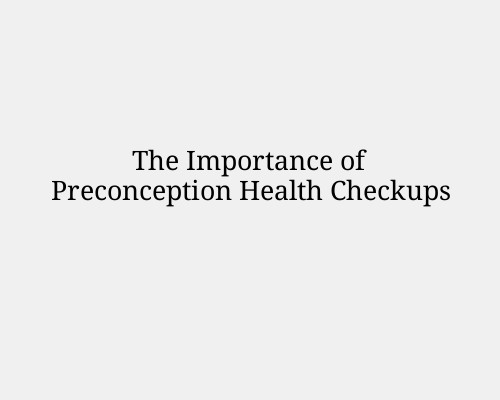
Understanding Preconception Health
Preconception health refers to the overall well-being of an individual before they conceive a child. It plays a crucial role in ensuring a healthy pregnancy and a positive outcome for both the mother and the baby. Many potential risks can be identified and managed before conception through proper medical check-ups, lifestyle changes, and necessary treatments. Preconception health check-ups are essential for individuals planning to conceive, as they help prevent complications and promote optimal reproductive health.
Why Preconception Health Check-ups Matter
Identifying and Managing Health Conditions
Pre-existing medical conditions, such as diabetes, hypertension, and thyroid disorders, can significantly impact pregnancy. A preconception check-up helps detect these conditions and ensures they are well-managed before conception. For instance, uncontrolled diabetes can increase the risk of birth defects, while high blood pressure can lead to complications such as preeclampsia.
Assessing Nutritional Deficiencies
Proper nutrition before conception is crucial for foetal development. A healthcare provider may recommend blood tests to check for deficiencies in essential nutrients like folic acid, iron, and vitamin D. Folic acid, in particular, is vital in preventing neural tube defects such as spina bifida. Women trying to conceive are often advised to take prenatal vitamins to address any deficiencies.
Reviewing Medications and Supplements
Certain medications and supplements can affect fertility and pregnancy. A preconception health check-up allows doctors to review any medications a woman or her partner is taking and make necessary adjustments. Some drugs can cause birth defects or pregnancy complications, so switching to safer alternatives is crucial.
Screening for Genetic Disorders
Genetic screening can help identify hereditary conditions that may affect a baby. If there is a family history of genetic disorders such as cystic fibrosis, sickle cell anaemia, or Tay-Sachs disease, a healthcare provider may recommend carrier screening. This information can help couples make informed decisions and explore reproductive options if needed.
Evaluating Reproductive Health
A preconception check-up includes an assessment of reproductive health, such as evaluating the menstrual cycle, checking for ovulation issues, and identifying conditions like polycystic ovary syndrome (PCOS) or
endometriosis. These conditions can affect fertility, and early intervention can improve the chances of conception.
Ensuring Vaccination Updates
Certain infections can harm a developing baby, making vaccination status an important aspect of preconception care. Vaccines for diseases such as rubella, measles, mumps, and varicella (chickenpox) should be up to date before pregnancy. Some vaccines, like the flu shot and COVID-19 vaccine, are recommended before and during pregnancy for added protection.
Promoting Healthy Lifestyle Changes
A preconception check-up provides an opportunity to discuss lifestyle habits that could impact fertility and pregnancy. Healthcare providers often advise individuals to:
Quit smoking and alcohol consumption – These substances can reduce fertility and increase the risk of birth defects and pregnancy complications.
Maintain a healthy weight – Obesity and being underweight can affect hormone levels and ovulation.
Manage stress levels – Chronic stress can interfere with fertility and overall well-being.
Adopt a balanced diet – Eating nutrient-rich foods supports reproductive health and foetal development.
Addressing Mental Health Concerns
Mental health is just as important as physical health when preparing for pregnancy. Conditions like depression and anxiety can affect fertility and increase the risk of complications during pregnancy. A preconception check- up allows healthcare providers to offer support, therapy, or medication adjustments if necessary.
Discussing Family Planning and Birth Spacing
Healthcare providers can offer guidance on the best timing for pregnancy based on an individual’s health status and lifestyle. Proper birth spacing (at least 18 months between pregnancies) is recommended to reduce the risk of preterm birth and low birth weight.
When to Schedule a Preconception Health Check-up
It is recommended to schedule a preconception check-up at least three to six months before trying to conceive. This allows enough time to address any health concerns, start necessary treatments, and adopt healthier habits. Both partners should consider a check-up, as male reproductive health also plays a role in conception and pregnancy outcomes.
Conclusion
A preconception health check-up is a crucial step for anyone planning to have a baby. It helps identify and manage potential risks, ensures optimal health, and increases the chances of a healthy pregnancy and baby. By taking proactive measures before conception, individuals can significantly improve their reproductive health and overall well-being.

